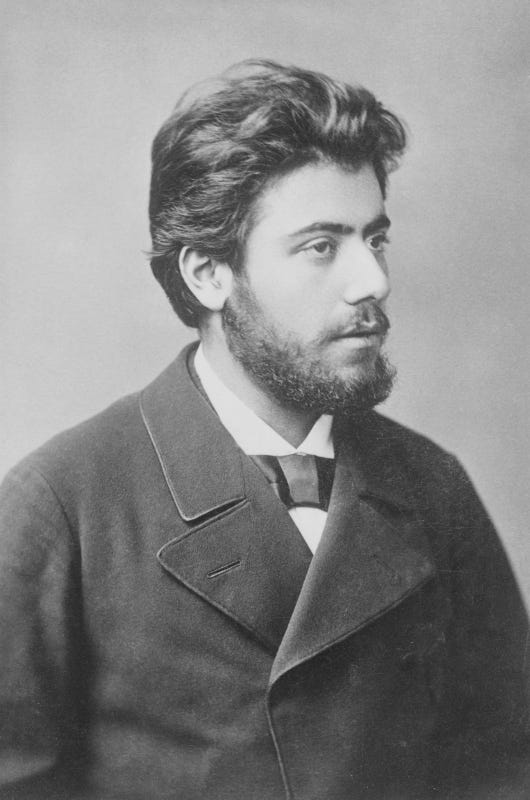
Gustav Mahler had every intention of becoming a composer. However, the professional success he attained and experienced during most of his career was based almost solely on his rather considerable skills as a conductor. Why did this happen?
In 1880, three years after graduating from the Vienna Conservatory, Mahler composed his first large piece, the incredibly dramatic cantata, Das klagende Lied (“The Song of Lamentation”) and submitted it in 1881 for the Beethoven Prize of the Vienna Conservatory.
It didn’t win. Mahler would later complain that the conservative jury’s decision condemned him to a life conducting in the theater. Let’s take a look at the jury members — Johannes Brahms, Karl Goldmark, Johann Nepomuk Fuchs, Josef Hellmesberger und Franz Krenn. Conservative, perhaps, but certainly not an incompetent jury. Let’s take a listen to the piece that did win the Beethoven Prize that year, Robert Fuch’s Piano Concerto in B flat minor, Op. 27.
The decision prompted Mahler to throw himself into a career of conducting and for the next four years didn’t compose, slowly moving himself up the ladder of conducting positions in provincial opera houses. In 1884, while working as the kapellmeister for the opera house in Kassel and inspired by his hopeless infatuation with one of the sopranos, Mahler composed his song cycle Lieder eines fahrenden Gesellen (“Songs of a Wayfarer”).
Four more years would pass when, in 1888, the twentyseven-year-old Mahler, now the second conductor at the Leipzig opera house, befriended the grandson of the famous German composer Carl Maria von Weber, who shared with Mahler his grandfather’s unfinished opera, Die Drei Pintos. Mahler completed it using the unfinished material as well as adding his own compositions. It was his first major success.
Unfortunately, Mahler fell in love (and probably had an affair) with Weber’s wife, Marion Mathilde. This hopeless romance resulted in Mahler throwing himself into his next composition, a five movement Symphonic Poem. Mahler left his post in Leipzig in May of 1888 and assumed a new post as General Music Director of the opera house in Budapest in October. A year later, in November of 1889, this five-movement Symphonic Poem was premiered. In 1891, Mahler became the chief conductor for the opera house in Hamburg and in 1893, there was a second performance of his Symphonic Poem, now with the subtitle, Aus dem Leben eines Einsamen (From the Life of a Lonely-one). It was not until 1896 for a performance in Berlin that he decided to omit the Blumine movement, finally creating what would become his Symphony №1. Let’s listen to this touching, omitted movement.
It was never well received during Mahler’s lifetime and the symphony didn’t really catch on until Bruno Walter and Leonard Bernstein performed and recorded it in the 1950’s and 60’s.
Here are my favorite performances.
I can’t help but share the San Francisco Symphony Youth Orchestra’s triumphant performance in the Berlin Philharmonie in 2012